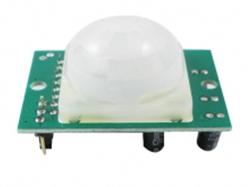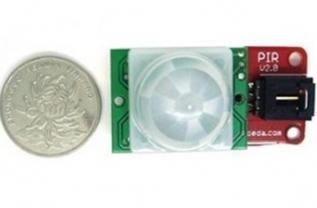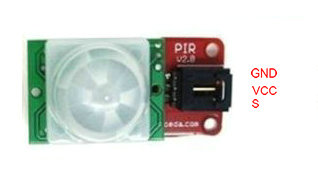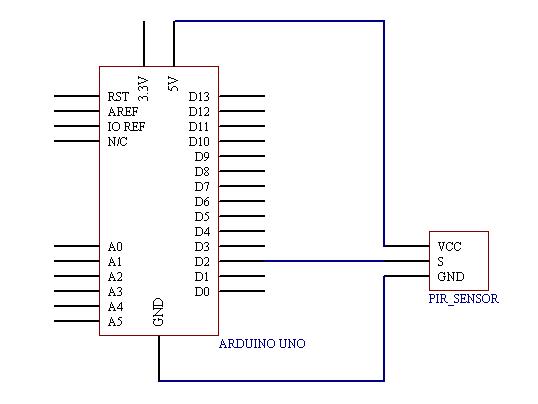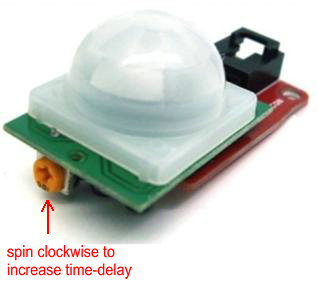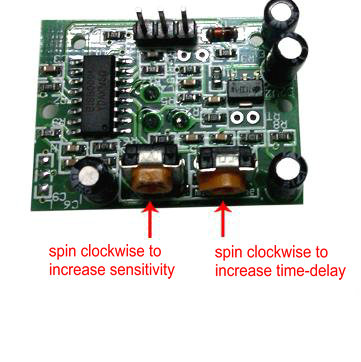Difference between revisions of "PIR motion sensor Module"
(→How to buy it) |
|||
| (9 intermediate revisions by the same user not shown) | |||
| Line 4: | Line 4: | ||
[[File:PIR2.jpg]] | [[File:PIR2.jpg]] | ||
| − | PIR sensors allow you to sense motion, almost always used to detect whether a human has moved in or out of the sensors range. They are small, inexpensive, low-power, easy to use and don't wear out.PIR sensor are basically made of a pyroelectric sensor | + | PIR sensors allow you to sense motion, almost always used to detect whether a human has moved in or out of the sensors range. They are small,inexpensive, low-power, easy to use and don't wear out.PIR sensor are basically made of a pyroelectric sensor ,which can detect levels of infrared radiation. Everything emits some low level radiation, and the hotter something is, the more radiation is emitted. The sensor in a motion detector is actually split in two halves. The reason for that is that we are looking to detect motion (change) not average IR levels. The two halves are wired up so that they cancel each other out. If one half sees more or less IR radiation than the other, the output will swing high or low. |
==Technical parameters== | ==Technical parameters== | ||
| − | *Operating voltage: DC5V | + | *Operating voltage: DC5V |
*Static power consumption: 65 microamps | *Static power consumption: 65 microamps | ||
*level output: high-5V, low-0V | *level output: high-5V, low-0V | ||
| Line 17: | Line 17: | ||
==Usage== | ==Usage== | ||
| + | When motion is sensed, pin S output 5V. There is a yelow knob on the back for adjusting the output pulse duration.Spinning clockwise increase the the output pulse duration. Spinning anticlockwise decrease the output pulse duration. To make the following test more explicit ,you need to spin the knob anticlockwise to the end to decrease the ouput duration. | ||
| + | |||
| + | The sensor module can't get to work immediately when it's energized. It starts to work about 15 seconds later after energized. | ||
| + | |||
[[File:PIR sensor3.jpg]] | [[File:PIR sensor3.jpg]] | ||
[[File:PIR sensor wiring.jpg]] | [[File:PIR sensor wiring.jpg]] | ||
| Line 27: | Line 31: | ||
} | } | ||
void loop(){ | void loop(){ | ||
| − | + | int pirVal = digitalRead(pirPin); | |
| − | + | if(pirVal == HIGH) | |
| − | + | { //was motion detected | |
| − | + | digitalWrite(13,HIGH); | |
| − | + | delay(50); | |
| − | |||
| − | |||
| − | |||
} | } | ||
| + | else { | ||
| + | digitalWrite(13,LOW); | ||
| + | } | ||
| + | } | ||
| + | |||
=== Adjustment === | === Adjustment === | ||
[[File:PIR sensor2.jpg]] | [[File:PIR sensor2.jpg]] | ||
Latest revision as of 01:32, 4 September 2012
Contents
Introduction
PIR sensors allow you to sense motion, almost always used to detect whether a human has moved in or out of the sensors range. They are small,inexpensive, low-power, easy to use and don't wear out.PIR sensor are basically made of a pyroelectric sensor ,which can detect levels of infrared radiation. Everything emits some low level radiation, and the hotter something is, the more radiation is emitted. The sensor in a motion detector is actually split in two halves. The reason for that is that we are looking to detect motion (change) not average IR levels. The two halves are wired up so that they cancel each other out. If one half sees more or less IR radiation than the other, the output will swing high or low.
Technical parameters
- Operating voltage: DC5V
- Static power consumption: 65 microamps
- level output: high-5V, low-0V
- Delay Time: adjustable (0.3 seconds to 18 seconds)
- embargo time: 0.2 seconds
- sensing range: less than 120 degrees angle, 7 meters
- Operating temperature: -15 ~ +70 degrees
Usage
When motion is sensed, pin S output 5V. There is a yelow knob on the back for adjusting the output pulse duration.Spinning clockwise increase the the output pulse duration. Spinning anticlockwise decrease the output pulse duration. To make the following test more explicit ,you need to spin the knob anticlockwise to the end to decrease the ouput duration.
The sensor module can't get to work immediately when it's energized. It starts to work about 15 seconds later after energized.
Example code
int pirPin = 2; //digital 2
void setup(){
pinMode(pirPin, INPUT);
pinMode(13, INPUT);
}
void loop(){
int pirVal = digitalRead(pirPin);
if(pirVal == HIGH)
{ //was motion detected
digitalWrite(13,HIGH);
delay(50);
}
else {
digitalWrite(13,LOW);
}
}
Adjustment
How to buy it
Click here to buy PIR sensor module
